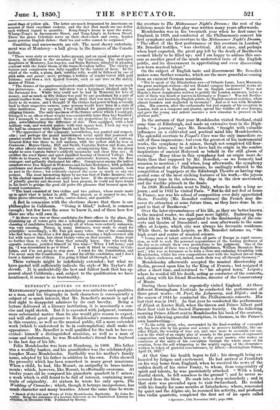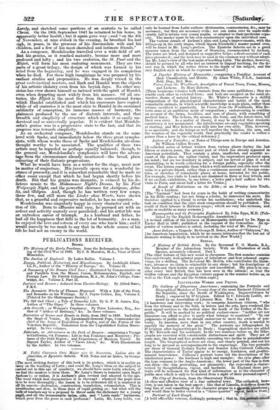BENEDICT's LECTURE ON 1EENDELSSOHN. * MxtrmassoinT's greatness as a musician was
united to such qualities as a man, and his biography in both characters is consequently a subject of so much interest, that Mr. Benedict's memoir is apt at first sight to disappoint admirers by its curt brevity. Being a lecture delivered at a literary institution, it is necessarily a con- cise and rapid sketch. But it is executed with judgment, contains more substantial matter than its size would give reason to expect, and will afford great pleasure to Mendelssohn's numerous friends in this country, as well as the musical public, till a more extended work (which is understood to be in contemplation) shall make its appearance. Mr. Benedict is well qualified for the task he has ex- ecuted: himself a distinguished musician, as well as a man of sense and information, he was Mendelssohn's friend from boyhood to the last day of his life.
Felix Mendelssohn was born at Hamburg, in 1809. His father was a wealthy banker, and his grandfather was the celebrated phi- losopher Moses Mendelssohn. Bartholdy was his mother's family name, adopted by his father in addition to his own. Felix showed the precocity which has been remarked in many great musicians. When a child, he had, like Mozart, an antipathy to brass instru- menta ; which, however, like Mozart, he effectually overcame. At twelve years old he composed his pianoforte quartett in C minor; a work which is still found to be full of interest., containing many traits of originality. At sixteen he wrote his only opera, The Wedding of Cameho ; which, though it betrays inexperience, has much character and many beauties. About the same time he wrote
Sketch of the Life and Works of Felix Mendelssohn Bartholdy. By Jules Be- nedict. Being the substance of a Lecture delivered at the Camberwell Literary In- stitution, in December 1849. Published by Murray.
the overture to The Midsummer Night's Dream the rest of the delicious music for that play was written many years afterwards. Mendelssohn was in his twentieth year when he first came to England, in 1829, and conducted at the Philharmonic concert his first symphony and his overture to the Midsummer Night's Dream. " The effect of the first performance of this overture in London," Mr. Benedict testifies, " was electrical. All at once, and perhaps when least expected, the great gap left by the death of Beethoven seemed likely to be filled up; and I inn happy to adduce this suc- cess as another proof of the much underrated taste of the English public, and its discernment in appretiating and even discovering new-born musical talent."
On the subject of English taste and discernment Mr. Benedict makes some further remarks, which are the more graceful as coming from an eminent German musician.
"Not to speak of the Elizabethan fera—of Orlando Lasso, Luca Marenzio, the.great madrigal-writers--did not Handel compose his immortal works al- most exclusively in England, and for an English audience ? Were not Haydn's finest symphonies written to gratify the London amateurs, before a note of them was heard or known in Germany or France ? Was not Beetho- ven revered and known by English artists, by English musical societies, when almost forsaken and neglected in Germany ? And so it was with Mendels- sohn. His renown, after the enthusiastic but just reports of his reception in London, both as a composer and pianist, spread like wildfire all over Europe!, and.gave the young and ardent maestro a new stimulus to proceed on his glorious path."
In the autumn of that year Mendelssohn visited Scotland, staid some time at Edinburgh, and made an extensive tour in the High- lands; "a journey," says Mr. Benedict., "fraught with valuable infiuences on a cultivated and poetical mind like Mendelssohn's. The splendid overture to Fingal's Cave was the only immediate re- sult of these impressions; but even the greatest of his instrumental works, the symphony in A minor, though not completed till four- teenyears later, may be said to have had its origin in the sombre inspirations of ancient Holyrood as beheld in the still gloom of evening." Many ideas in this symphony had an origin more de- finite than that supposed by Mr. Benedust,—as we formerly had occasion to mention ; f and when, long afterwards, the symphony was performed at the Philharmonic, he smilingly referred to the competition of bagpipers at the Edinburgh Theatre as having sug- gested some of the most striking features of his work,—the joyous. strathspey tune in the scherzo, the dirge in the slow movement, and the warlike pibroch in the finale.
In 1830 Mendelssohn went to Italy, where he made a long so-
journ • and in 1832 he visited Paris. But he did not feel at homeFrance, nor was his school of composition ever duly appretiated
there. Possibly (Mr. Benedict continues) the French may dis- cover its attraction at some future time, as they have done in, re- gard to that of Beethoven." Over the later oircumstances of his life, as they are better known. to the musical reader, we shall pass more lightly. Embracing the artist life in 1833, he was appointed to the directorship of the con- certs and theatre of Dusseldorf ; and soon afterwards to the same office at Leipsic, which city was always his favourite residence. While there, he made Leipsic, as Mr. Benedict informs us, " the high court and centre of musical science.
Young men of talent arrived from all parts of Europe in rapid succes- sion, as well to seek the personal acquaintance of the leading professor of the day as to submit their own productions to hisjudpaent. One of the most prominent of these was a young Englishman, Sterndale Ben- nett ; who was so fortunate as to form a close and enduring friendship with Mendelssohn, whilst his own compositions met with the highest favour from the Lcipsic audiences, and, indeed, made their way all through Germany."
Mendelssohn afterwards accepted the musical directorship at Berlin, pressed upon him by the King of. Prussia ; but resigned it after a short time, and returned to " his adopted town," Leipsio • where he resided ;ill his death, acting as conductor of the concerto,,: and, along with his friend Moscheles, direotor of the Conservatory of Music.
During these labours he repeatedly visited England. At three different Birmingham Festivals he conducted the performance of three great works—St. Paul, the ,Lobllosang, and Elfjah ; and in the season of 1844 lie conducted tha Philharmonic concerts. His. last visit was in 1847. In that year he conducted the performance of Elijah at Exeter Hall, when the Queen and Prince Albert paid their first visit to the Sacred Harmonic Society. On the following morning Prince Albert sent to Mendelssohn his book of the oratorio, with the following graceful inscription, in German, in the Prince's own handwriting- " To the noble artist, who, surrounded by the Baal-worship of corrupted art, has been able by his genius and science to preserve faithfully, like an- other Elijah, the worship of true art, and once more to accustom our ear, lost in the whirl of an empty play of sounds, to the pure notes of expressive composition and legitimate harmony; to the great master, who makes us- conscious of the unity of his conception through the whole maze of his creation,. from the soft whispering to the mighty raging of the elements— written in token of grateful remembrance, by Albert.—Buckingham Palace, April 24, 1847."
At that time his health began to fail • his strength being ex- hausted by fatigue and excitement. lie had arrived at Frankfort on his way home from England, when he received the news of the sudden death of his sister Fanny, to whom, from congeniality of spirit and talents, he was passionately attached. " With a loud, fearful shriek, he fell senseless to the ground "; and he never re- covered from the blow. He sunk into a deep melancholy ; and in that state was prevailed upon to visit Switzerland. He resided with his family for some months at Interlacken; where, renovated by quiet and the Alpine air, he resumed his activity, and produced two violin quartetts, completed the first act of an opera called + Spectator, 13th November 1847; page 1098. Sorely, and sketched some portions of an oratorio to be called Christ. On the 19th September 18,47 he returned to his home, in apparently better health ; but it again gave way ; and " on the 4th of November, at nine o'clock in the evening, he breathed his last sigh, in peace, in the presence of his disconsolate wife and his children, and a few of his most cherished and intimate friends."
As a composer, Mendelssohn travelled over a wide field of art. But his genius, as it reached maturity, became more and more profound and lofty • and his two oratorios, the St. Paul and the _BOA, will form his most enduring monument. They are two parts of a great trilogy, the design of which was formed in his mind from the beginning, and he was engaged in its completion when he• died. For these high imaginings he was prepared by his earliest studies and propensities. He was deeply versed in the great ecclesiastical masters, and Bach and Handel were the objects of his artistic idolatry even from his boyish days. No other mu- sician has ever shown himself so imbued with the spirit of Handel, even when departing most widely from his manner. Of all ora- torios, the _Noah is the most free from the conventional forms which Handel established and which his successors have copied.; while of all oratorios it is the most akin to Handel in its sustained sublimity of conception, its immense masses of harmony, the
produced by the use of diatonic intervals, and that adth and simplicity of structure which make it so easily un- derstood and so universally popular. It is evident that Mendels- sohn's genius was in a progressive state to the last, and that its progress was towards simplicity.
As an orchestral composer Mendelssohn stands on the same level with Spohr, and immediately below the three great syrapho- 'lists, with whose works those of Spohr and Mendelssohn are alone thought worthy to be associated. The qualities of these two artists may be regarded as perhaps equally balanced; though, to the general ear, Mendelssohn's symphonies will have the advan- tae the circumstance already mentioned—the broad, plain colouring of their diatonic progressions.
What he would have been as a writer for the stage, must now
be matter of conjecture. His juvenile opera was a wonderful in- stance of precocity, and.it is somewhatremarkable that he made no other essay except that which he had began shortly before his death. But that his genius was dramatic, is evinced by his de- licious music to the Midsummer Night's Dream, by his First Walpurgis Night, and the powerful choruses for Ant:gone, Atha- Ha, and CEdipus. And, though he has written very few songs, those few, and still more the Lieder ohne Worte, have shown that, as a graceful andexpressive melodist, he has no superior. " Mendelssohn was singularly happy in every character and rela- tion of life. Burn to affluence and ease, he pursued art with an ardour and activity scarcely ever paralleled; and his artist life was an unbroken career of triumph. As a husband and father, he had all the happiness that falls to the lot of humenity. As a man, he enjoyed the love and esteem of every one who knew him ; and it would scarcely-be too much to say that in the whole course of his life lie had not an enemy in the world.



























 Previous page
Previous page